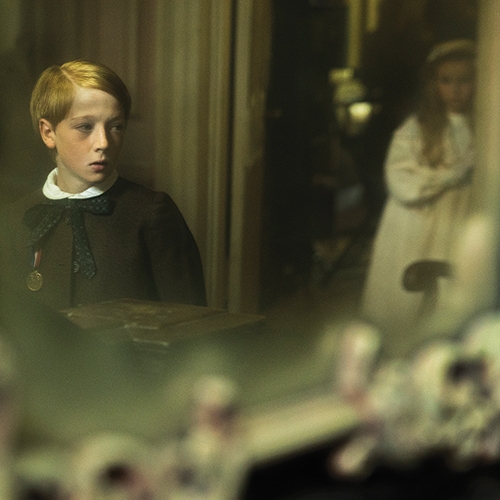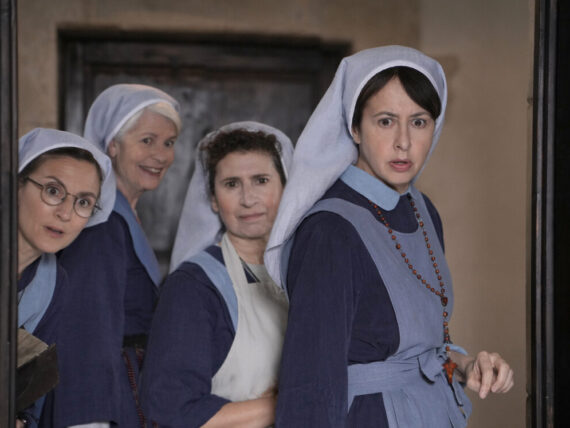Caroline Morley reviews The Little Stranger, showing at Plymouth Arts Centre until this Thursday (tickets available here).
“This house works on people” muses an enigmatic Charlotte Rampling in director Lenny Abrahamson’s follow up to his 2015 critically-acclaimed film, Room. Adapted by Lucinda Coxon and based on Sarah Waters’s 2009 novel, The Little Stranger, Abrahamson has crafted an elegant, slow-burn gothic horror.
Seeming at first glance to be a conventional haunted house thriller, The Little Stranger refuses to conform to the tired tropes of its genre. Instead Abrahamson’s film is more akin to a character-driven chamber piece, suffused with an atmosphere of mournful mystery.
We enter this world through Faraday (Domhnall Gleeson) a rural, working class doctor who, in the summer of 1948, makes a house call to Hundreds Hall, a cavernous Warwickshire estate where his mother once worked as a maid. Home to the genteel Ayres family, the crumbling Hall’s decay is unsettlingly palpable. Formerly a beacon of wealth and privilege, the declining mansion has fallen into disrepair – a gothic mirror to Evelyn Waugh’s Brideshead Castle.
Faraday is met by the man of the house, Roderick (Will Poulter) a Second World War veteran constricted by painful burn scars and tormented by PTSD. His sister Caroline (Ruth Wilson) is a no-nonsense, whip-smart young woman, stymied by her role as her brother’s carer. Ruling over them both is the reserved, but regal matriarch, Mrs Ayres (Rampling), who refuses to publicly acknowledge her family’s fading fortunes and is tormented by the loss of her first child. All three are isolated and lonely in their own way, and seem to be going slowly mad, incrementally driven to insanity by something sinister in the house itself. But is their mental decline purely a result of suppressed trauma, or something less explicable and more malevolent? The terrified maid, Betty (Liv Hill) whom Faraday has been called to treat, thinks the latter. Spooked by the creaking manor she fakes illness so that she might be discharged from the Ayres’ service and freed from the Hall’s oppressive atmosphere.
Much like Henry James‘ The Turn of the Screw and its film adaptation The Innocents, Coxon and Abrahamson use the gothic horror setting to delve into the human psyche and explore the effects that suppressed trauma has on lives of those scarred by it. The desaturated cinematography creates a foggy, fuzzy landscape that seems almost supernaturally removed from the busyness of post-war England. Combined with the mesmerizing sound design, it’s reminiscent of Alejandro Amenábar’s The Others, another loose adaptation of Henry James’ novella.
But The Little Stranger is much more than just another iteration of the horror guessing game which asks the audience whether it is really ghosts, or if it’s all in the characters’ minds. The decaying house is a metaphor for the slow, drawn-out death of the British class system. Abrahamson expertly shows how the strict rigidity of this social hierarchy, which diminishes one group of people and elevates another, is destructive to all on both sides of the divide, and creates exactly the right atmosphere of repression to nurture horror. The waning gentry’s desperate desire to cling to the past makes them apt for a haunting.
But it is in the character of Faraday that the disastrous effects of the class structure are most adeptly embodied. The young Faraday, who we see in flashbacks visiting the Hall in its imposing prime, desperately wanted the privileged life he was excluded from. An intelligent, ambitious boy, his mother raised him on stories about the wonders of the house and the family who lived there. His whole life becomes contorted by his desire for acceptance from people who refuse to see him as their equal.
As the archetypal rational outsider who knows something is very wrong, but can’t quite put his finger on what, Gleeson excels in a portrait of English repression, all severe professionalism and implacable formality, which is carefully peeled away to reveal a darker, more exploitative bent. He is superbly matched by Wilson’s taught performance as the pragmatic spinster trapped as much by her class as Faraday is by his. In many ways Faraday and Caroline mirror one another – both far too clever for their station in life, and equally nervous of each other, their fledgling romance seems to portend a happier future for both. But her delight in escaping Hundreds Hall, and the wanton abandon with which she dances at the party they attend together, incite a hitherto unseen streak of jealousy in the doctor. When he gets angry, the sinister presence in the house begins to exert itself, and we wonder if his pursuit of Caroline is not instead his attempted conquest of the house itself.
Much like Room, Abrahamson uses The Little Stranger to probe the effects of literal and figurative imprisonment, and how it warps the mind. Despite his decision to clarify what Waters left ambiguous, the uneasy uncertainty about events at Hundreds Hall chillingly remains. It is precise and subtle filmmaking that, like the Hall itself, casts a beguiling spell.
Caroline Morley









Comments
Comments are closed.